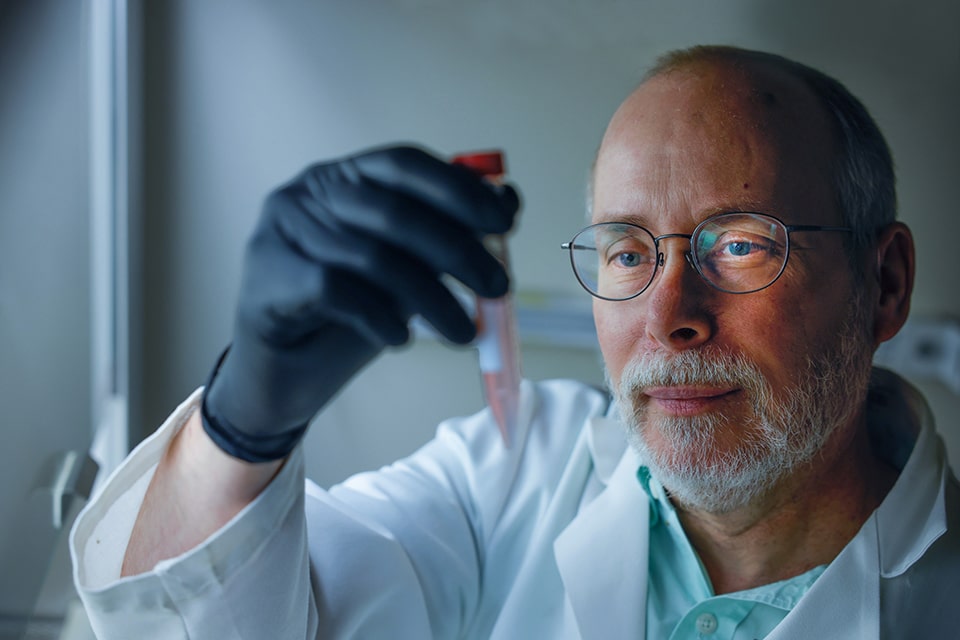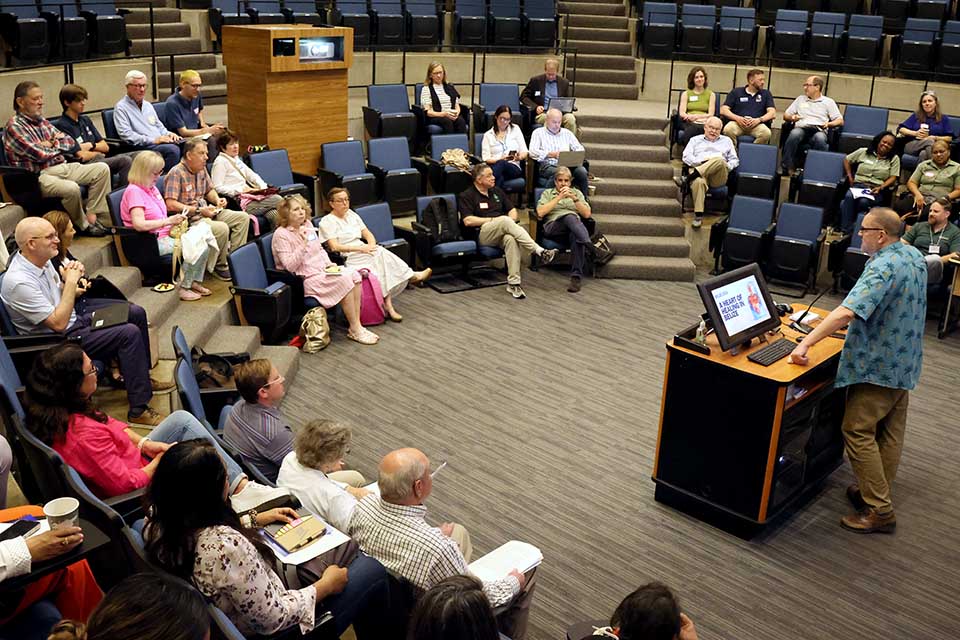SLU Fighting Food Insecurity On and Off Campus
Food connects us all. It is a way to express yourself, connect with others, grow and maintain health, among many other things. But throughout the United States and around the world, there are far too many people who do not have access to food.
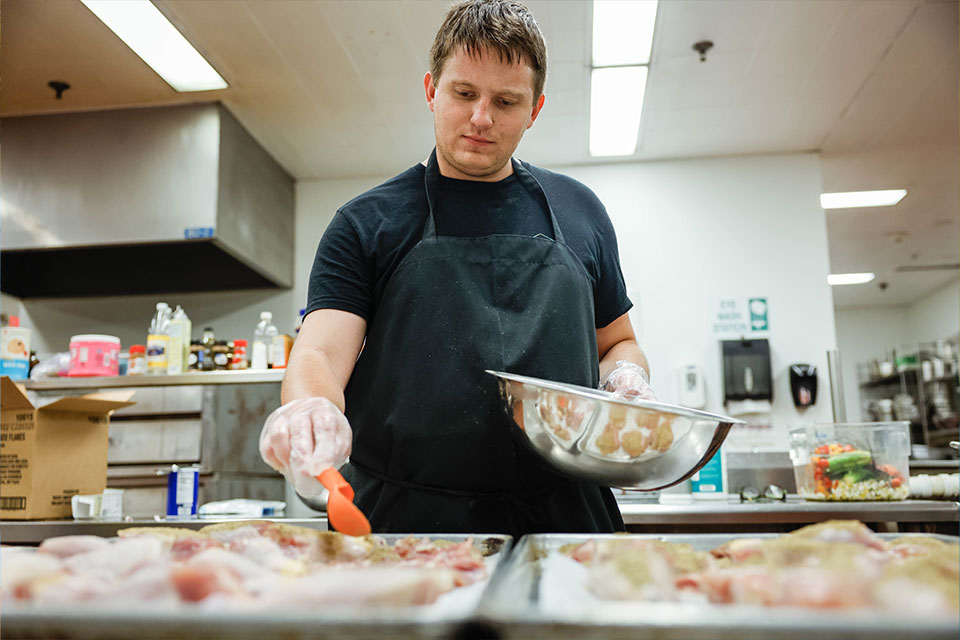
A SLU student dusts seasoning on chicken as the organization prepares meals in the Campus Kitchen for families in need. Photo by Sarah Conroy.
In October, President Biden announced an effort to fight this “food insecurity” in the United States, through a variety of investments, initiatives and programs. His lofty goal is to eradicate hunger in the country by 2030.
Saint Louis University is already fighting this battle throughout the community; both on campus and in the surrounding neighborhoods, bringing access to food to students, Midtown residents and the unhoused.
One of those initiatives for students is Billiken Bounty. Billiken Bounty directly serves the SLU community, as students can go to the on-campus food pantry and receive fresh produce, non-perishable items, hygiene products, food accessories and more. The pantry is completely run by student volunteers, who manage the organization’s budget, go on shopping runs, stock the food pantry and manage the pantry when open.
Maxine Taylor, co-chairwoman for Billiken Bounty, has been involved with the organization since her freshman year, and has seen the impact of food insecurity first-hand.
“I learned of food insecurity very abstractly in my classes,” Taylor said. “But Billiken Bounty held an event at my dorm, and it was a chance for me to impact my own community in a positive way. I had learned how food insecurity can have such a big impact on someone’s health, both in the present and the future, and this was a perfect opportunity to get involved in my community and make a positive difference.”
Billiken Bounty relies on donations for much of that budget. Throughout the school year, students, faculty and staff can donate food items to the pantry, and the organization also holds food drives at various times each semester. It also accepts monetary donations, which go toward transportation and grocery costs.
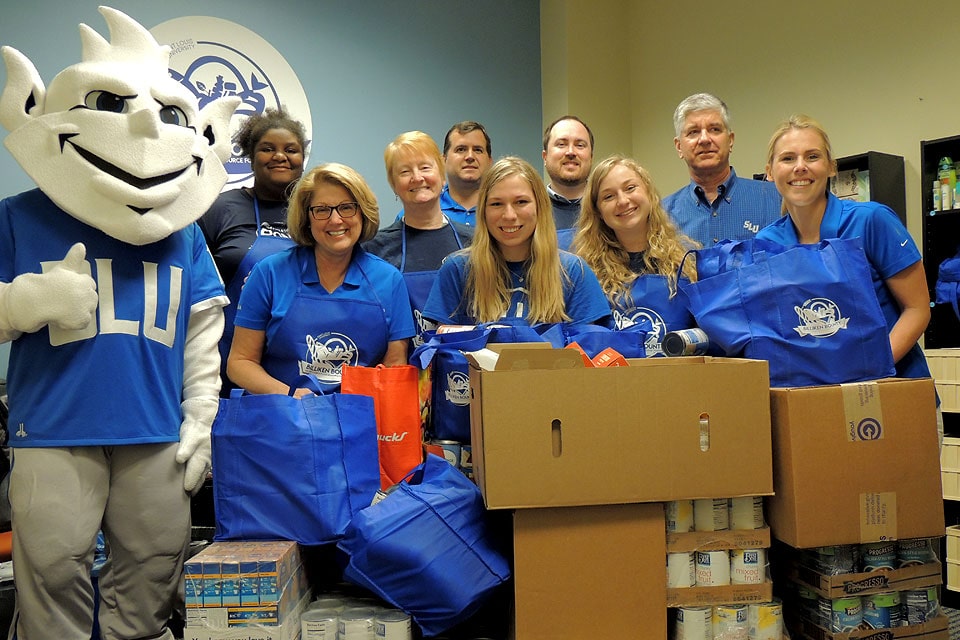
Throughout the school year, students, faculty and staff can donate food items to Billiken Bounty to help fight food insecurity on campus. File photo.
Students may be food insecure for a variety of reasons. Billiken Bounty has learned students may have to wait extended periods of time between paychecks, which can make obtaining food and other necessities difficult. Students may also not have access to transportation to go to a grocery store, or may have too large of a course/workload to be able to cook food. Billiken Bounty also sees many international and graduate students visiting the food pantry, and unfamiliarity with local food sources can contribute to their food insecurity. Billiken Bounty hopes to limit or eliminate all of these factors for SLU students.
“We see the pantry mainly being utilized by graduate students, because they don't have access to the same meal plan that undergrad students do,” Taylor said. “Others may have a limited amount of time because of a job or children, or St. Louis may just be a brand-new city to them and they don’t know how to access resources yet. So we always are open-minded and willing to provide whatever someone may need, and want to make Billiken Bounty as welcoming as possible.”
Currently, Billiken Bounty restocks its shelves once every two weeks, and receives pre-made meal deliveries once a week. Unfortunately, the need for the food pantry and its products is higher.
“Everyone is always super thankful and super appreciative when they come to Billiken Bounty,” Taylor said. “Something I'm really proud of is that we try to stock food in the pantry that is useful for college students and food that students actually want to cook and eat. We want to make sure that regardless of when someone comes to Billiken Bounty, they’re going to be able to bring home some food they’re going to enjoy.”
With food and other products going to students within days and even hours of going on the shelves, the Billiken Bounty has also worked to provide and connect students to other services to allow food-insecure students to get the help they need. The Billiken Bounty connects students to a shuttle that runs every weekend, taking students from campus to various grocery stores in the surrounding area for free, allowing them to shop without needing their own transportation. It also has resources to help students apply for food stamps, recipe guides to help students make healthy meals with what they have currently in their pantry and fridge, and more.
“Yes, we have a list of outside resources for students to use,” Taylor said. “We have information on other food banks and food pantries and also how to apply for food stamps in Missouri if eligible. We have exit surveys for students to fill out, and one resource we found a lot of students lacked was transportation, which led to their food insecurity. So we have information on how to access shuttles on the weekends to go to the Brentwood shopping centers to go grocery shopping or other shopping. We also have really just been trying to focus on providing information about external resources.”
While combating food insecurity within its direct community, SLU also is dedicated to providing for those outside its campus borders, and it does so through Campus Kitchen.
Campus Kitchen is another student-led organization that cooks meals in Reinert Hall and then delivers those meals to residents in Midtown and to various shelters in the surrounding areas. More than 3,000 volunteers every year dedicate their time to prepare food, cook, bake, package or deliver 500 meals to the surrounding community every week.
Nikhil Samayam, chairman of Campus Kitchen, joined the organization in his first semester at SLU and is continually impressed with the impact the organization makes every week.
“It’s really more than just delivering a meal,” Samayam said. “Every time you make a delivery, you’re building relationships with those in the community. You’re letting them know that this organization is actively trying to help any way possible, and the way we know best to do that is through meals. Seeing the joy and the appreciation on each of our community members’ faces emphasizes why we do this.”
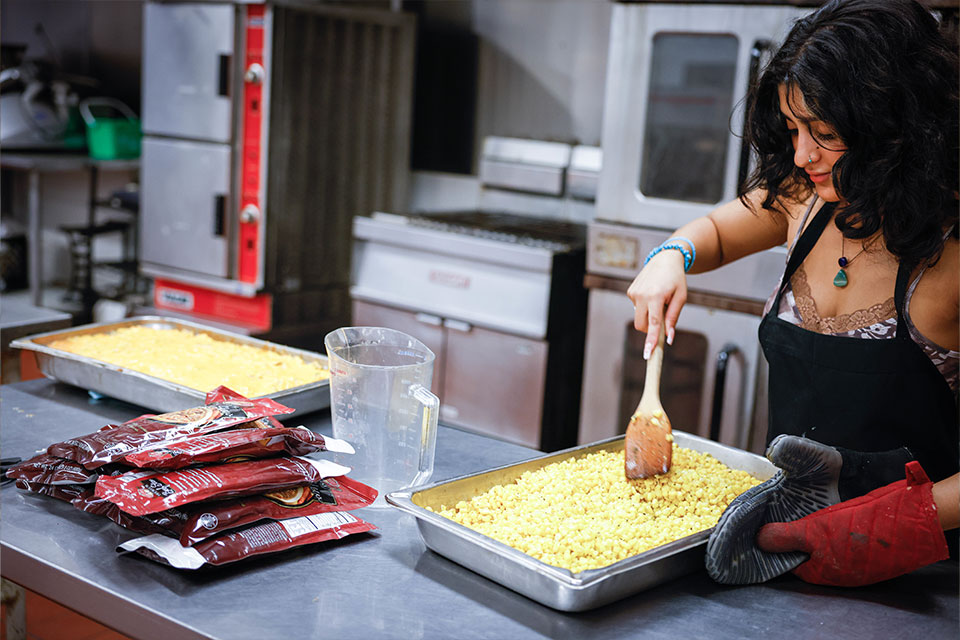
More than 3,000 volunteers every year dedicate their time to Campus Kitchen to prepare food, cook, bake, package or deliver 500 meals to the surrounding community every week. Photo by Sarah Conroy.
Campus Kitchen receives all of the ingredients for its meals from a variety of sources; from businesses such as Trader Joe’s; from Sodexo, which supplies food for all of SLU’s dining halls; from St. Louis Area Foodbank, and from other student-led organizations. Campus Kitchen also accepts individual donations throughout the year and holds its annual Turkeypalooza food drive ahead of Thanksgiving.
Through all these outlets, Campus Kitchen receives up to 1,500 pounds of supplies from these organizations to create meals for deliveries each week. Every pound of food accepted by Campus Kitchen is considered surplus, meaning the food is unspoiled, but unfit for sale due to packaging damage, blemishes or other reasons.
“Our mission is to eliminate food waste, and in turn, we will eliminate hunger,” Samayam said. “How much food can we gather from the organizations and how can we stop that from going to waste? We try to repurpose that food and make it into meals so those who don't have food can get a chance at living a healthy and nutritional lifestyle.”
Not only do these meals provide a healthy lifestyle for community members, it also provides a stable food environment for them. Twice a week, SLU students bring them meals, creating days where community members don’t have to worry or wonder about how they will eat, and will allow them to save resources to provide for themselves and their families the other days of the week.
“Our community members can expect meals coming in on certain days of the week, and they count on that happening,” Samayam said. “Regardless whether it's a school week, or it's the middle of the summer, or a holiday break, we always put a meal out because hunger doesn't wait for the next business day. We really try to emphasize consistency with our members, that we hand deliver it at the same times every week, every week.”
Every meal consists of four categories: protein, vegetables, starch and dessert, and they aim to cover all of the major food groups a person needs for a balanced diet, allowing them to get nutrition they may not otherwise have the opportunity to get.
“Often the word food desert is thrown around, but the area around SLU is more of a food swamp,” Samayam said. “If you are on a budget, as many of our local community members are, there is a swamp of food options that are maybe in your budget, but aren't necessarily the most healthy. That's what Campus Kitchen is trying to eliminate. We're trying not to just give them food, because some already have access to food. We're trying to give them access to healthy food.”
Campus Kitchen began at SLU in 2001 and has since expanded to more than 60 other college campuses around the kitchen. The organization is why Samayam decided to attend SLU in the first place, and since joining, he’s become even more involved because of the impact he’s able to make on larger community at SLU.
“Cooking was my way of showing care for people,” Samayam said. “I always find sharing a meal with a person to be one of the more caring things you can do to show someone, quite simply, that you care for them. Because cooking is a time-taking procedure and a labor of love. Being able to share that love with those around the SLU community is incredible rewarding and my way to leave my mark on SLU and St. Louis.”
SLU’s mission is to care for the whole person. For St. Louis, the whole person means all persons. Food insecurity affects us all, either directly or indirectly.
SLU students created Billiken Bounty and Campus Kitchen to provide one of life’s most basic necessities and to be men and women for others.
Latest Newslink
- We Should Treat More People with Hepatitis B, SLU Expert SaysIn a pair of articles published in Lancet Gastroenterology and Hepatology, scientists lay out the case for why we should expand treatment recommendations for people with hepatitis B.
- Running Interference: Scientists Block Viral RNA, Aim to Cure Hepatitis BIn a recent paper published in Science Translational Medicine, a SLU scientist reports that a class of drugs called RNA interference (RNAi) therapeutics represent a major advancement in the treatment of chronic hepatitis B virus infections.
- Belize2020 Looks Ahead at SLU SummitEarlier this summer, Belize2020 organized a summit at Saint Louis University. Ten years after the coalition was created, with strong support from SLU to support Jesuit ministries in Belize, organizers felt the time was right to meet again.
- William L. Clay Sr., 1931-2025One of SLU's first African-American graduates, former Congressman William L. Clay Sr., died July 17, 2025, at the age of 94. He served in the U.S. House of Representatives for 32 years, becoming a towering figure in the fight for civil rights and social justice in St. Louis and nationally.
- A Camp Friendship that Stirred Up Lifelong BondsIn the summer of 2005, Mary Kate Keenoy (Chaifetz Grad '22) and Genevieve Willman met at SLU's Gardens to Tables culinary camp. What started as a shared interest in cooking grew into a lasting friendship that has endured for two decades.
- Bruce Bacon, M.D.: 1949-2025Bruce Bacon, M.D., professor emeritus of internal medicine, died Sunday, July 6, 2025. He was 75. Bacon was known globally for his expertise in all aspects of clinical hepatology, specifically hemochromatosis, viral hepatitis, chronic liver disease / general hepatology, and liver transplant. Bacon was also a member of the research team that discovered the gene for hemochromatosis, HFE, in 1996.









